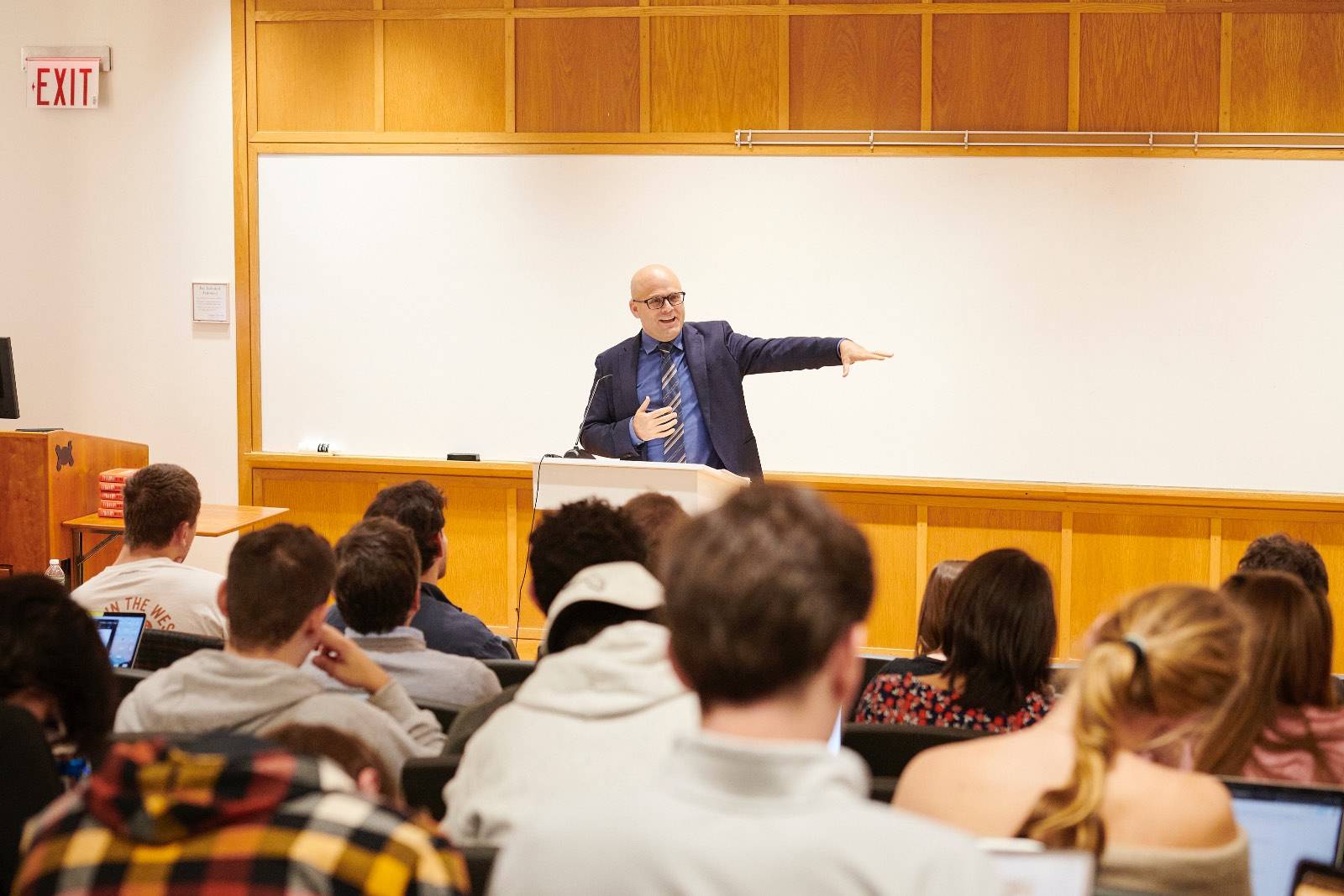Tyranny of the Minority author Daniel Ziblatt believes American democracy is in trouble, but steps can be taken to get the country back on track. Ziblatt, who is also the Eaton Professor of government at Harvard University, shared his perspective on the nation’s democratic decline at a lecture sponsored by the Lampert Institute of Civic and Global Affairs on Oct. 17.
“According to decades of political science research, rich, old democracies don’t die,” Ziblatt says, noting that the current decline of one of the world’s richest and oldest democracies is a bit of a puzzle. He says the two main culprits of the decline of democracy in America are the radicalization of the Republican party and the nation’s existing political institutions.
Ziblatt says since 2016 there has been a “backsliding” that has led to a significant decline in the quality of American democracy, while perhaps not as severe as in countries such as Hungary, Turkey, or India. He says that, a decade ago, the United States was ranked 94/100 on the Freedom House ranking of democracy status, in the company of countries such as Canada, Germany, and the United Kingdom. Today, the United States has a score of 83/100, tied with Romania and two points below Argentina, with the fall in ranking attributed to government efforts to restrict the right to vote, threats against election workers, and threats by a president to overturn the transition of power. Parties are more likely to turn against democracy when they or their constituents feel they face an existential threat or loss of status due to the current transition to multi-racial democracy in the United States, he adds.
“The United States is undergoing a transition that no democracy has really successfully undergone, one in which a longstanding dominant ethnic majority loses not only its numerical majority but also its dominant status in society,” Ziblatt says. This has created the perception among MAGA voters and some Republicans that “the country they grew up in is being taken away from them. That’s a really powerful perception of an existential threat that’s powerful enough to turn people away from democracy.”
Democracy really can’t survive unless you have at least two political parties committed to basic democratic rules, even though partisans will often claim it is only their party that is committed to democratic values, Ziblatt says. Regardless of the political party, he says, a party committed to democracy must do three things: unambiguously accept the winning or losing results of elections, reject the use of violence to gain or hold on to power, and clearly break with antidemocratic extremists who engage in the first two behaviors.
Ziblatt said the remedy for this decline is more democracy, through reforms that ensure electoral majorities can win power and govern, including entrenching voting rights and ensuring equal access to the ballot, replacing the Electoral College with direct presidential elections, democratizing the Senate by eliminating or weakening the filibuster, expanding the House of Representatives, and establishing term limits for Supreme Court justices.
A full recording of this lecture, including a question and answer session with the audience, may be viewed here. For more information on Lampert Institute’s events, visit the Lampert Institute webpage or subscribe to its newsletter.
Daniel Ziblatt is Eaton Professor of government at Harvard University and director of the Transformations of Democracy group at Berlin’s Social Science Center (WZB Berlin Social Science Center).
Ziblatt specializes in the study of European politics, democracy, state-building, and historical political economy. He is the author of four books, including How Democracies Die (Crown, 2018), co-authored with Steve Levitsky, a New York Times best-seller described by The Economist magazine as “the most important book of the Trump era.” The book has been translated into 30 languages.
In 2017, he authored Conservative Parties and the Birth of Democracy (Cambridge University Press), an account of the history of democracy in Europe, which won the American Political Science Association’s 2018 Woodrow Wilson Prize for the best book in government and international relations. His first book was an analysis of 19th-century state building, Structuring the State: The Formation of Italy and Germany and the Puzzle of Federalism (Princeton, 2006).
His newest book, co-authored with Steven Levitsky, is titled Tyranny of the Minority (Crown, 2023). The book puts America’s contemporary transition into a multiracial democracy in comparative and historical perspective and shows the distinctive vulnerabilities of the U.S. constitutional order. In 2023, Ziblatt was elected a member of the American Academy for Arts and Sciences.
